BusinessEurope Headlines No. 2016-34
Wake up call to defend the collective interests of Europe to avoid ending up in misery and poverty
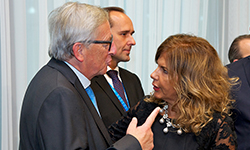 Speaking at the Tripartite Social Summit on 19 October, in presence of President Tusk, President Juncker and Slovak Prime Minister Fico, BusinessEurope President Emma Marcegaglia underlined that the challenges facing Europe are unprecedented and that we need to increase growth and employment, improve security, tackle migration issues and deal with the decision of the United Kingdom to leave the European Union. Ahead of the European Council meeting on 20-21 October, President Marcegaglia stressed the importance of trade, saying “If we don’t bring home the agreement with Canada and shoot our common trade policy in the foot, we cannot win our battle for competitiveness, growth and employment“. Together with the other social partners, she also clearly said that “companies and workers must not pay the price for Brexit. We want to maintain as close as possible economic relations between the European Union and the United Kingdom, but not at the expense of the integrity of the Single Market. There can be no cherry-picking between the four freedoms”. As manufacturing industry is the central growth and job creation driver for all sectors of the economy, including services, President Marcegaglia also called for the inclusion of a structured European roadmap on EU industrial policy strategy in the Commission work programme 2017. “If we do not wake up now to defend the collective interests of Europe again, we will all end up in misery and poverty” concluded President Marcegaglia.
Speaking at the Tripartite Social Summit on 19 October, in presence of President Tusk, President Juncker and Slovak Prime Minister Fico, BusinessEurope President Emma Marcegaglia underlined that the challenges facing Europe are unprecedented and that we need to increase growth and employment, improve security, tackle migration issues and deal with the decision of the United Kingdom to leave the European Union. Ahead of the European Council meeting on 20-21 October, President Marcegaglia stressed the importance of trade, saying “If we don’t bring home the agreement with Canada and shoot our common trade policy in the foot, we cannot win our battle for competitiveness, growth and employment“. Together with the other social partners, she also clearly said that “companies and workers must not pay the price for Brexit. We want to maintain as close as possible economic relations between the European Union and the United Kingdom, but not at the expense of the integrity of the Single Market. There can be no cherry-picking between the four freedoms”. As manufacturing industry is the central growth and job creation driver for all sectors of the economy, including services, President Marcegaglia also called for the inclusion of a structured European roadmap on EU industrial policy strategy in the Commission work programme 2017. “If we do not wake up now to defend the collective interests of Europe again, we will all end up in misery and poverty” concluded President Marcegaglia.
Contact: Daniele Olivieri
BusinessEurope calls for greater reciprocity in the bilateral economic relationship with China
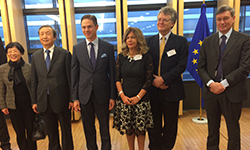 “The business community expects pragmatism, reform, openness, reciprocity, and cooperation”, President Emma Marcegaglia told policy-makers at the 6th EU-China High Level Economic Dialogue hosted by European Commission Vice-President Jyrki Katainen and Chinese Vice-Premier Ma Kai. “China and Europe need to work together and reciprocate in terms of openness because businesses operate in a global ecosystem”, she continued. In an era of increased economic uncertainty, China and Europe need to reflect on how each can be a source of stability and prosperity for the other, and for the world. BusinessEurope remains committed to the global rules-based trading system, but we have to demonstrate that trade makes sense and that trade delivers jobs and growth. This is a key area where Europe and China need to work together, particularly in the context of the WTO.
“The business community expects pragmatism, reform, openness, reciprocity, and cooperation”, President Emma Marcegaglia told policy-makers at the 6th EU-China High Level Economic Dialogue hosted by European Commission Vice-President Jyrki Katainen and Chinese Vice-Premier Ma Kai. “China and Europe need to work together and reciprocate in terms of openness because businesses operate in a global ecosystem”, she continued. In an era of increased economic uncertainty, China and Europe need to reflect on how each can be a source of stability and prosperity for the other, and for the world. BusinessEurope remains committed to the global rules-based trading system, but we have to demonstrate that trade makes sense and that trade delivers jobs and growth. This is a key area where Europe and China need to work together, particularly in the context of the WTO.
Contact: Maurice Fermont
Three key words about the future of Europe: unity, prosperity, and security
 “The European business community strongly believes in the future of Europe. We are and want to be part of the solution. But in order to be able to fully play their role in society, European companies need a supportive environment. Making concrete steps and introducing reforms to build a better Europe is more urgent than ever” said BusinessEurope President Emma Marcegaglia during her intervention in the German-Italian Business Forum organised by BDI and Confindustria in Bolzano on 13 October 2016, in presence of Italian Minister of Economic Development Carlo Calenda and the Presidents of BDI, Ulrich Grillo and Confindustria, Vincenzo Boccia. For President Marcegaglia there are three key words to answer companies and citizens’ concerns about their future in Europe: unity, prosperity, and security.
“The European business community strongly believes in the future of Europe. We are and want to be part of the solution. But in order to be able to fully play their role in society, European companies need a supportive environment. Making concrete steps and introducing reforms to build a better Europe is more urgent than ever” said BusinessEurope President Emma Marcegaglia during her intervention in the German-Italian Business Forum organised by BDI and Confindustria in Bolzano on 13 October 2016, in presence of Italian Minister of Economic Development Carlo Calenda and the Presidents of BDI, Ulrich Grillo and Confindustria, Vincenzo Boccia. For President Marcegaglia there are three key words to answer companies and citizens’ concerns about their future in Europe: unity, prosperity, and security.
Contact: Daniele Olivieri
Roundtable: Practitioners and policy-makers meet to discuss geo-blocking proposal
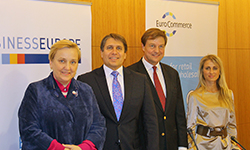 It is widely acknowledged that legal certainty is paramount for businesses and consumers to feel encouraged to engage in the single market. While supporting the aim of the geo-blocking proposal to boost cross-border e-commerce, the business community points to the need for adjustments in the proposal, especially regarding applicable rules, for instance, in terms of after-sales services and legal guarantees. Businesses also urge policy-makers not to overlook the objective of tackling fragmentation in the single market, as this is the real root cause of geo-blocking and differential treatment. These messages came out of the joint BusinessEurope - EuroCommerce Roundtable on geo-blocking, on 18 October 2016. The event brought together Members of the European Parliament, Commission officials, the EU Presidency, national Permanent Representations and company representatives to discuss the practical implications of the Commission proposal and the way forward. BusinessEurope also launched a video where Director General Markus J. Beyrer comments on geo-blocking in the single market.
It is widely acknowledged that legal certainty is paramount for businesses and consumers to feel encouraged to engage in the single market. While supporting the aim of the geo-blocking proposal to boost cross-border e-commerce, the business community points to the need for adjustments in the proposal, especially regarding applicable rules, for instance, in terms of after-sales services and legal guarantees. Businesses also urge policy-makers not to overlook the objective of tackling fragmentation in the single market, as this is the real root cause of geo-blocking and differential treatment. These messages came out of the joint BusinessEurope - EuroCommerce Roundtable on geo-blocking, on 18 October 2016. The event brought together Members of the European Parliament, Commission officials, the EU Presidency, national Permanent Representations and company representatives to discuss the practical implications of the Commission proposal and the way forward. BusinessEurope also launched a video where Director General Markus J. Beyrer comments on geo-blocking in the single market.
![]()
![]() Contact: Jeroen Hardenbol or Pedro Oliveira
Contact: Jeroen Hardenbol or Pedro Oliveira
Autumn Economic Outlook: EU recovery continues despite Brexit vote
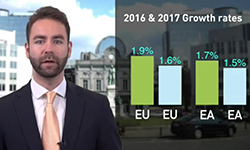 European business federations expect the EU’s economic recovery to continue in the coming months despite an increasingly challenging international environment. BusinessEurope’s latest Economic Outlook projects growth of 1.9% for the EU and 1.7% for the Euro Area in 2016. For 2017, we expect the EU to grow with 1.6% and the Euro Area with 1.5%. So far, the vote of the UK to leave the European Union does not appear to have significantly damaged business confidence. However, there could be more important economic implications in the longer term.
European business federations expect the EU’s economic recovery to continue in the coming months despite an increasingly challenging international environment. BusinessEurope’s latest Economic Outlook projects growth of 1.9% for the EU and 1.7% for the Euro Area in 2016. For 2017, we expect the EU to grow with 1.6% and the Euro Area with 1.5%. So far, the vote of the UK to leave the European Union does not appear to have significantly damaged business confidence. However, there could be more important economic implications in the longer term.
![]()
![]() Contact: Frederik Lange
Contact: Frederik Lange
Effective investment protection a must for European competitiveness
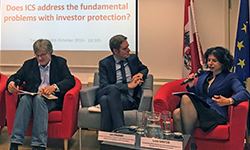 “Investment Protection provisions need to be in place to ensure the competitiveness of European businesses,” said BusinessEurope International Relations Director Luisa Santos during the event “Investment Court System put to the test: Does ICS address the fundamental problems with investor protection?” organised on 18 October by Austrian Trade Unions and Friends of the Earth. A heated debate is taking place on Investor-to-State Dispute Settlement (ISDS), its merits and its potential deficiencies. BusinessEurope agrees that the old ISDS needs to be improved. The introduction of a new system is necessary, to ensure high levels of protection for European investors all over the world. With the new Investment Court System (ICS), the European Commission has introduced significant changes to the old ISDS, making investor-state dispute settlement more institutionalised and transparent. Although BusinessEurope recognises that the ICS goes into the right direction by improving ISDS, some concerns on e.g. the level of protection offered to investors and the functionality of the Court System, remain. For instance, the introduction of an appellate mechanism is in principle a good idea. However, as this is a new element that has never been used in the past it remains to be seen how this could work in practice. Another example is the application of the ‘Loser-Pays Principle’, which may impede the access of SMEs to the system. On the positive side, BusinessEurope welcomes the idea to establish a Multilateral Investment Court. Although we recognise that this project requires time, we believe this will help level the playing field between European investors and their competitors.
“Investment Protection provisions need to be in place to ensure the competitiveness of European businesses,” said BusinessEurope International Relations Director Luisa Santos during the event “Investment Court System put to the test: Does ICS address the fundamental problems with investor protection?” organised on 18 October by Austrian Trade Unions and Friends of the Earth. A heated debate is taking place on Investor-to-State Dispute Settlement (ISDS), its merits and its potential deficiencies. BusinessEurope agrees that the old ISDS needs to be improved. The introduction of a new system is necessary, to ensure high levels of protection for European investors all over the world. With the new Investment Court System (ICS), the European Commission has introduced significant changes to the old ISDS, making investor-state dispute settlement more institutionalised and transparent. Although BusinessEurope recognises that the ICS goes into the right direction by improving ISDS, some concerns on e.g. the level of protection offered to investors and the functionality of the Court System, remain. For instance, the introduction of an appellate mechanism is in principle a good idea. However, as this is a new element that has never been used in the past it remains to be seen how this could work in practice. Another example is the application of the ‘Loser-Pays Principle’, which may impede the access of SMEs to the system. On the positive side, BusinessEurope welcomes the idea to establish a Multilateral Investment Court. Although we recognise that this project requires time, we believe this will help level the playing field between European investors and their competitors.
Contact: Sofia Bournou
The evidence of the regulation-innovation link
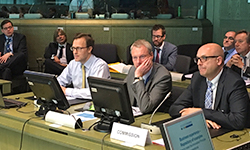 Regulation has a strong influence on the innovation capacity and activities of the private sector. Well-drafted legislation can stimulate innovation; however, poor legislation can also stifle it. These messages and concerns were voiced during the presentation of a new repository of examples, collected by BusinessEurope, in the Council meeting on 13 October. Industrial Affairs Director Alexandre Affre presented this case-study of specific regulatory cases to representatives of the member states to provide evidence on how concrete regulation affects innovation. Beside examples, he also suggested how to tackle the governance issues and improve the Better Regulation toolbox. Together with the Commission’s European Political Strategy Center Legal Adviser, Christian Calliess, he elaborated on the Innovation principle as one of the tools.
Regulation has a strong influence on the innovation capacity and activities of the private sector. Well-drafted legislation can stimulate innovation; however, poor legislation can also stifle it. These messages and concerns were voiced during the presentation of a new repository of examples, collected by BusinessEurope, in the Council meeting on 13 October. Industrial Affairs Director Alexandre Affre presented this case-study of specific regulatory cases to representatives of the member states to provide evidence on how concrete regulation affects innovation. Beside examples, he also suggested how to tackle the governance issues and improve the Better Regulation toolbox. Together with the Commission’s European Political Strategy Center Legal Adviser, Christian Calliess, he elaborated on the Innovation principle as one of the tools.
Contact: Jan Bambas
Internationalisation of SMEs: assessing the EU Programme for the Competitiveness of Enterprises and SMEs
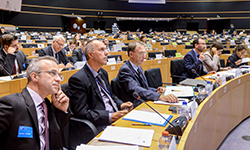 SME internationalisation has been discussed in a workshop of the European Parliament Committee on Industry, Research and Energy on 12 October, chaired by MEP Paul Rübig. BusinessEurope Director of SMEs and entrepreneurship Daniel Cloquet assessed the instruments deployed under the Programme for the Competitiveness of Enterprises and SMEs (COSME) to promote SME internationalisation, including the Enterprise Europe Network (EEN), the Intellectual Property Rights Helpdesks and the Cluster programme for SMEs. He gave an overall positive feedback regarding these instruments. The EEN has become more effective thanks to recommendations made by BusinessEurope. Room for improvement remains in some specific areas, e.g. the governance of the Network. Taking a broader perspective, Daniel Cloquet stressed the vital importance of trade agreements like TTIP and CETA for SMEs.
SME internationalisation has been discussed in a workshop of the European Parliament Committee on Industry, Research and Energy on 12 October, chaired by MEP Paul Rübig. BusinessEurope Director of SMEs and entrepreneurship Daniel Cloquet assessed the instruments deployed under the Programme for the Competitiveness of Enterprises and SMEs (COSME) to promote SME internationalisation, including the Enterprise Europe Network (EEN), the Intellectual Property Rights Helpdesks and the Cluster programme for SMEs. He gave an overall positive feedback regarding these instruments. The EEN has become more effective thanks to recommendations made by BusinessEurope. Room for improvement remains in some specific areas, e.g. the governance of the Network. Taking a broader perspective, Daniel Cloquet stressed the vital importance of trade agreements like TTIP and CETA for SMEs.
Photo copyright: European Union 2016
Contact: Daniel Cloquet
Tax Policy Group meets Commission’s top tax official
 “Commission initiatives in the field of taxation should better seek to support EU competitiveness”, was the key message of BusinessEurope’s Tax Policy Group when it welcomed Stephen Quest, the European Commission’s Director-General for Taxation and Customs Union to its meeting on 18 October. The group discussed recent tax policy initiatives with him including the Anti-tax Avoidance Directive, VAT action plan and the Financial Transcation Tax. They added that they shared the European Commission’s objective to fight tax fraud and tax evasion as it creates strong competitive distortions at the expense of the vast majority of businesses who pay their taxes in full. However, BusinessEurope remains particularly concerned by proposals to implement public country-by-country reporting as they risk damaging competitiveness and thus reducing EU economic growth.
“Commission initiatives in the field of taxation should better seek to support EU competitiveness”, was the key message of BusinessEurope’s Tax Policy Group when it welcomed Stephen Quest, the European Commission’s Director-General for Taxation and Customs Union to its meeting on 18 October. The group discussed recent tax policy initiatives with him including the Anti-tax Avoidance Directive, VAT action plan and the Financial Transcation Tax. They added that they shared the European Commission’s objective to fight tax fraud and tax evasion as it creates strong competitive distortions at the expense of the vast majority of businesses who pay their taxes in full. However, BusinessEurope remains particularly concerned by proposals to implement public country-by-country reporting as they risk damaging competitiveness and thus reducing EU economic growth.
![]() Contact: Pieter Baert
Contact: Pieter Baert
Making sure that regulation allows Europe to take advantage of the full potential of big data
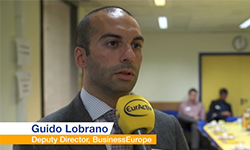 “Big data is about analysis of large data sets to find new correlations to spot trends and address societal challenges. Legislators need to find the right balance to let Europe profit from the benefits of big data”, stressed BusinessEurope Deputy Director Guido Lobrano on 18 October at Euractiv’s “Big Data & Policy making” debate. Big data can also help policy makers take decisions based on better evidence. The private sector is leading the way with big data applications in health, transport, weather forecast and many other areas. Interaction with decision makers can amplify the benefits and help address the regulatory questions in a balanced manner, looking not only at potential risks but also the demonstrated opportunities of big data.
“Big data is about analysis of large data sets to find new correlations to spot trends and address societal challenges. Legislators need to find the right balance to let Europe profit from the benefits of big data”, stressed BusinessEurope Deputy Director Guido Lobrano on 18 October at Euractiv’s “Big Data & Policy making” debate. Big data can also help policy makers take decisions based on better evidence. The private sector is leading the way with big data applications in health, transport, weather forecast and many other areas. Interaction with decision makers can amplify the benefits and help address the regulatory questions in a balanced manner, looking not only at potential risks but also the demonstrated opportunities of big data.
![]() Contact: Guido Lobrano
Contact: Guido Lobrano
European Services Card will only boost cross-border services if well designed
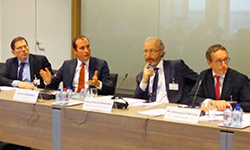 While services represent the largest share of the EU economy, cross-border service provision is still underdeveloped. This is due to remaining administrative and regulatory obstacles that hamper companies and in particular small and medium sized enterprises to operate across borders. The European Services Card initiative is a novel approach to help businesses go out into the single market, but it will only work if it is well-designed and companies in the construction and business services sectors see the added value. This was stressed by BusinessEurope’s Senior Adviser for services, Jeroen Hardenbol, at a panel discussion on the initiative, organised by the Benelux Secretariat on 14 October. It is essential that companies really see the added value of asking for the voluntary card to skip certain administrative procedures and requirements already fulfilled in the home member state. Furthermore, the initiative should lead to regulatory simplification as member states become more aware of each other’s procedures and share best practices. The European Commission is expected to present a proposal by the end of this year.
While services represent the largest share of the EU economy, cross-border service provision is still underdeveloped. This is due to remaining administrative and regulatory obstacles that hamper companies and in particular small and medium sized enterprises to operate across borders. The European Services Card initiative is a novel approach to help businesses go out into the single market, but it will only work if it is well-designed and companies in the construction and business services sectors see the added value. This was stressed by BusinessEurope’s Senior Adviser for services, Jeroen Hardenbol, at a panel discussion on the initiative, organised by the Benelux Secretariat on 14 October. It is essential that companies really see the added value of asking for the voluntary card to skip certain administrative procedures and requirements already fulfilled in the home member state. Furthermore, the initiative should lead to regulatory simplification as member states become more aware of each other’s procedures and share best practices. The European Commission is expected to present a proposal by the end of this year.
![]() Contact: Jeroen Hardenbol
Contact: Jeroen Hardenbol
No new regulation needed on data ownership, access and liability
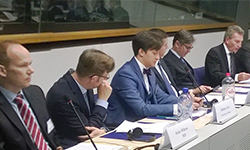 “BusinessEurope believes that data ownership, access and liability are adequately addressed by existing rules”, said Heiko Willems - Chair of BusinessEurope’s Legal Affairs Committee - to European Commissioner Günther Oettinger at the 17 October conference on “Building a European Data Economy”. Existing rules grant fair access and use of data, as well as protect the subjects involved. The current practice based on private agreements permits companies to control data streams, to use data to improve products and services, to create new ones, and allows for many more potentially endless aims. For the time being, this provides the flexibility needed to innovate. New untested rules and restrictions to data ownership would not be justified and might undermine an innovative data economy.
“BusinessEurope believes that data ownership, access and liability are adequately addressed by existing rules”, said Heiko Willems - Chair of BusinessEurope’s Legal Affairs Committee - to European Commissioner Günther Oettinger at the 17 October conference on “Building a European Data Economy”. Existing rules grant fair access and use of data, as well as protect the subjects involved. The current practice based on private agreements permits companies to control data streams, to use data to improve products and services, to create new ones, and allows for many more potentially endless aims. For the time being, this provides the flexibility needed to innovate. New untested rules and restrictions to data ownership would not be justified and might undermine an innovative data economy.
Contact: Guido Lobrano
Calendar
 20-21 October 2016: European Council
20-21 October 2016: European Council- 24-27 October 2016: European Parliament Plenary in Strasbourg
- 24 October 2016: Power Market Event
- 27 October 2016: EU-Canada summit